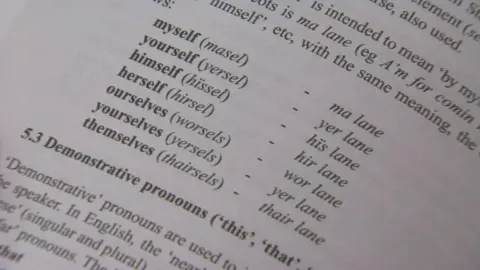Language and identity laws could spell significant change
 Getty Images
Getty ImagesThey dominated political debate in Northern Ireland for years, but in the end new language laws have been given Royal Assent with relatively little fanfare.
The passing of the Identity and Language (Northern Ireland) Act 2022 at Westminster is, however, notable in many ways and will eventually usher in significant change.
But for the minute there are no practical changes as a result of the new legislation.
That is because we do not yet know when the measures outlined in the act will start, as what is known as a "commencement order" has not brought the laws into force yet.
A Northern Ireland Office spokesperson told BBC News NI that "Royal Assent to the Identity & Language (NI) Act is a key milestone in the delivery of the commitments set out in New Decade, New Approach".
"The government is carefully considering its next steps on commencement, and will provide regular updates to parliament on the act's implementation."
However, that implementation is not dependent on an executive being formed at Stormont.
That is because the act gives the Northern Ireland secretary powers to introduce any of the measures in the absence of an executive.
As most of the new laws were signposted in the New Decade New Approach (NDNA) agreement in 2020, however, we know most of what to expect.
An Office of Identity and Cultural Expression will be set up
That office will guide public bodies and monitor how they provide services to users of minority languages.
More vaguely, it will "increase the capacity and resilience of people in Northern Ireland to address issues related to differences in national and cultural identity".
It will also fund events and projects that "support, and promote the celebration of, the cultural and linguistic heritage of all people living in Northern Ireland".

But there is an important difference between what the new law says about the office and what was in NDNA.
The 2020 deal said that the first minister and deputy first minister would appoint a director of the Office of Cultural Identity and Cultural Expression.
The act changes that to a director and "five other members appointed by the first minister and deputy first minister acting jointly".
Effectively that means there will be six main decision makers in the office rather than one, all appointed by the two largest parties in the assembly or the secretary of state.
It is not without precedent - at one point Northern Ireland had four victims' commissioners.
But what that will mean for the operation of the office is unclear.
Will it speed up or slow down decision making?
The new laws also say that "the first minister and deputy first minister acting jointly may direct the office in relation to the exercise of its functions".
That may mean that the first and deputy first ministers, if they can agree, could have a large say in shaping what the office does.
Two commissioners will also be appointed: an Irish-language commissioner and a commissioner "for the Ulster Scots and the Ulster British tradition".
They will also have an office and staff and will be appointed jointly by the first and deputy first minister, or the secretary of state in the absence of an executive.
The Irish-language commissioner's main role is to advise and set standards for public bodies on how they use Irish, and investigate complaints when those bodies fall short of services to Irish speakers.
But, again, according to the act "the first minister and deputy first minister acting jointly may direct the commissioner in relation to the exercise of the commissioner's functions".
 PA
PAThat has led some Irish language speakers fearing there could be a political veto on the some of the commissioner's decisions.
The Ulster-Scots commissioner's role is a bit more vague.
They will also encourage and monitor how public bodies deliver services in Ulster-Scots.
But they also have to "enhance and develop the language, arts and literature associated with the Ulster-Scots and the Ulster-British tradition in Northern Ireland".
Again, any recommendations they make will have to be run by the first and deputy first ministers.
What is the Castlereagh Foundation?
In the act, the Office of Identity and Cultural Expression has to set up the Castlereagh Foundation.
It is named after Viscount Castlereagh, who was a leading statesman behind the 1800 Act of Union and helped defeat the 1798 rebellion by the United Irishmen.
He also served as secretary of state for war and foreign secretary in the early 19th century.
But we know little about the foundation, beyond that it is "a fund to support academic research through universities and other partners to explore identity and the shifting patterns of social identity in Northern Ireland," according a statement from the Northern Ireland Office in 2021.
 Liam McBurney/ PA Wire
Liam McBurney/ PA WireIn July 2021, the UK government appointed the former DUP leader and first minister Arlene Foster to chair a six-person advisory committee for the foundation.
In an earlier social media post in May 2021, Mrs Foster said that it would enable "young people who have ideas about the future of Northern Ireland to explore those thoughts".
But a report the advisory committee was meant to provide to the secretary of state on how the foundation would operate has not yet been made public.
Can Irish now be formally used in court in Northern Ireland?
It is not clear yet, although the new laws repealed the Administration of Justice (Language) Act (Ireland) 1737 which said all proceedings in courts "shall be in English".
But again the secretary of state has yet to state when that repeal comes into force and Irish can be used in court.
So theoretically, a fine could still be handed out to anyone speaking Irish in court, although that is thought to be unlikely.
But some things which did not need legislation have already changed as a result of New Decade New Approach.
An Irish and Ulster-Scots language translation service for public bodies was set up in 2021.
There will be also be simultaneous translation into Irish and Ulster-Scots in the assembly.
Meanwhile, long-term strategies to develop the use and promotion of both Irish and Ulster-Scots are being developed.
They are separate to the language laws.
